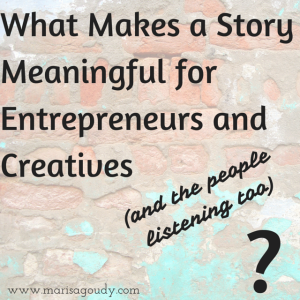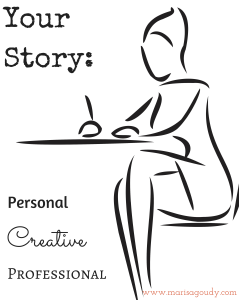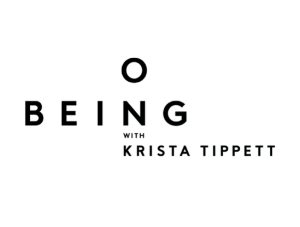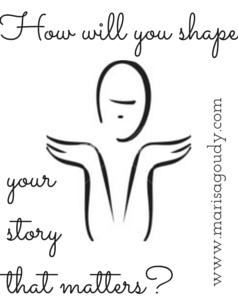What Makes a Story Meaningful for Entrepreneurs and Creatives (and the people listening too)?
The Sovereign Standard, Issue 10
“Your story.”
What does that mean to you?
Is it the glittering through line that makes you who you are?
 Or is it self serving? Is it the verbal unpacking of a lifetime’s baggage?
Or is it self serving? Is it the verbal unpacking of a lifetime’s baggage?
Is it something you’re meant to explore and expand?Is it something you’re supposed to expunge and escape?
What belongs in your story?
Is your story autobiographical, or is it that novel shored up inside you?
Are all stories created equal? Is fact worth more than fiction, or vice versa? And what about that gray place in between where you feel you have the most to say?
And do you have an obligation to your story?
Must you tell it for yourself, your ancestors, your children so everyone understands something about your line and legacy?
Must you tell it for an unknown reader who may be inspired, transformed, even saved because your narrative assures them they’re not alone?
The Sovereign Standard is dedicated to inspiring fresh questions rather than churning out "shoulds" and one size fits all answers. This week, let’s focus on helping you set your own Sovereign Standard by asking what makes a meaningful story.
Your Story: Personal. Creative. Professional.
 I believe that your story is important. More than an account of “this happened” and then “that happened,” your story is an interweaving of the personal, professional, and creative. And, depending on your disposition, you may agree that it has a spiritual dimension as well.
I believe that your story is important. More than an account of “this happened” and then “that happened,” your story is an interweaving of the personal, professional, and creative. And, depending on your disposition, you may agree that it has a spiritual dimension as well.
Telling your story is important on a personal level because exploring the events, relationships, and dreams that carried you to this moment helps you understand what you really want from the present and the future.
You need to develop your story to feed yourself at the creative level too. Not just so you can make art or create compelling content, but because exercising your creative abilities enables to you to solve business problems and meet all of your life with greater flexibility and joy.
Your story is important professionally because running a business is never just about business… at least not if you’re a creative entrepreneur. All your “stuff” will come up as you deal with financial pressures, difficult people, and the press to be a success (however you define that).
That’s the crux of business writing that goes beyond blogging: when you explore and develop your own story and your brand’s story, your able to define "success" and understand the work you’re truly meant to do.
And your story matters to those who will hear it or read it.
We know that memoir has become a wildly popular art form in the last few years. Is it because we’re just a bunch of voyeurs? No, we can just go to People magazine for that.
Instead, we want to understand the alchemical process of living through a first hand account. We want to know how others have faced adversity, climbed great heights, and experienced everyday life with a level of magic and grace.
On Being a Student of Story
 During a recent car ride I had a chance to meander through Krista Tippet’s On Being podcast library. Each conversation was rooted in story, even though each guest described vastly different experiences and perspectives.
During a recent car ride I had a chance to meander through Krista Tippet’s On Being podcast library. Each conversation was rooted in story, even though each guest described vastly different experiences and perspectives.
I invite you to savor these samples and dive deeper into whichever story calls to you. Below you'll find how the wisdom an activist, musician, and poet might help your transform how you perceive and share own story.
Stories That Empower, Stories that Don’t
Some stories do limit us, sustaining our victimhood through a tired recitation of how we’ve been done wrong. But other stories actually secure our sovereignty by uplifting both the teller and the audience.
Nathan Schneider, a voice for the Millennial generation who has published a book on God and another book on the Occupy Movement, was asked about the source of his despair and the source of his hope:
I think the sense of despair that I feel comes from the stories - when people tell each other stories in which they have no agency. You know, when we tell each other stories in which someone else has to do it for us.
And for me, the experiences of hope are often the stories I’m kind of grasping to be able to tell, and I know people are grasping to be able to tell, but that we see in the world where people are living that agency. And building the kinds of communities that we need, you know, to resist the injustice that has sunk so deeply into our world.
I hope that we can learn to tell those stories better.
Stories for Ourselves, Stories for Others
Joe Henry, award-winning producer and singer-songwriter, quotes the monk and spiritual writer Thomas Merton:
If you write for God, you will reach many men and bring them joy. If you write for men, you may make some money, and you may give someone a little joy, and you may make a noise in the world for a little while. If you write only for yourself, you can read what you yourself have written, and after ten minutes you'll be so disgusted that you will wish that you were dead.
Henry adds his own thoughts about another writer who expressed a similar idea through a more secular lens, the philosopher, as an architect, as a social scientist Buckminster Fuller:
His thought was I am exponentially more successful when I am working for the good of the most people.
When I was trying to serve myself, I wasn't successful at all.
When I worked to benefit ten people, I was that much more successful. When my work was to benefit a thousand people, I was that much more successful.
And when I thought that the work that I was doing would benefit all mankind, I was infinitely beyond my imagination successful.
But You Don’t Transform the Story By Simply Playing with Pronouns
When you write for the web, particularly when you’re trying to persuade someone to take action, you’re advised to cut back on the “I” and focus on the “you.”
The reader is always asking “what’s in it for me?” and you need to make that clear by speak directly to her problems and her needs. When you just focus on what makes you so qualified or successful, you lose the readers’ interest quickly.
And yet… We know there is power in memoir, and Mary Oliver has certainly taught us that there is power in poetry. Her level of trust in her craft and in her relationship with the reader allowed her to tip that advice on its head:
And always I wanted the "I." Many of the poems are "I did this. I did this. I saw this." I wanted them — the "I" to be the possible reader rather than about myself. It was about an experience that happened to be mine but could well have been anybody else’s. And that was my feeling about the "I."
I have been criticized by one editor who felt that "I" would be felt as ego. And I thought, no, well, I'm going to risk it and see. And I think it worked. It enjoined the reader into the experience of the poem. I became the kind of person who did the walking and the scribbling but shared it.
Ultimately, the power of a story is about so much more than whether it employs the “I” or “you.”
How Will You Shape Your Story that Matters?
 So much of what I have learned about story I have learned from Jeffrey Davis of Tracking Wonder.
So much of what I have learned about story I have learned from Jeffrey Davis of Tracking Wonder.
On the blog this week I describe how working with him on my own fiction empowered me to transform my relationship with creativity and entrepreneurship, and even with my family and my very sense of self.
Last year, I attended his live intensive for authors and now I am helping him spread the word about his six month author’s mentoring program.
Find some details here or, if you are really intrigued, send me an email and I can get you access to the details and the early bird discounts. I'd love to tell you more about my experience and why I truly believe in the magic he brings to the world.

